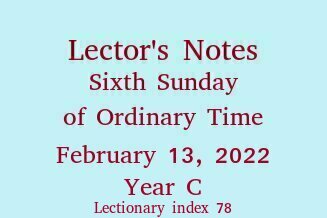

Sixth Sunday of Ordinary Time, year C, February 16, 2025
Jeremiah prophesied in Jerusalem, six centuries before Jesus, trying to persuade leaders and people to remain faithful. This short, blunt list of good and bad behaviors prepares us to hear Jesus' list in today's gospel
The early church in Corinth was filled with many controversies. Last week we learned that some challenged Paul's authority as an apostle. Today we learn that some did not believe that we shall rise from the dead. This is Paul's response.
This is Jesus' list of blessings first, then curses. Unlike Jeremiah, he predicts reversals in the fortunes of those now apparently blessed and of those now apparently cursed.
Our Liturgical Setting: Today's gospel, Luke 6:17, 20-26, contains a list of beatitudes as well as a list of curses. The first reading is Jeremiah's short list: one curse and one beatitude, in great detail.
The Historical Background: Jeremiah lived for about 70 years, around 600 years before Jesus. Most of his work was in Judah's capital Jerusalem, where he struggled to keep the people and the leaders faithful to God in an atmosphere of political intrigue and deceit. He was blunt and outspoken, and he suffered at the hands of the powerful for it. His simple "either or" message in today's reading is as direct as a prophet can get.
The "book" we know now as Jeremiah's isn't a linear narrative like many modern works. It's a collection of collections of his oracles and sayings, and the context in which Jeremiah delivered them is not always clear. It's also true that other sages of that day used this form: a list of wicked behaviors and/or a list of good ones. This list is just a very short one.
Your Proclamation: It's a simple message deserving a straightforward proclamation. Just be sure your hearers can hear the difference between the curse and the blessing. So choose a low tone of voice to proclaim the curse, pause before sentence beginning "Blessed is the one...", and adopt a higher tone to finish the blessing.
The Historical Situation: As last Sunday's reading and notes showed, some Christians at Corinth did not believe in the prospect of resurrection of the dead. Here Paul argues vigorously with them. Your proclamation should be vigorous, too.
Proclaiming it Rhythmically: In music, we use the word staccato to describe short, clipped notes, played rapidly with distinct breaks between them, like the Mexican Hat Dance (when they play it at the baseball park, you clap twice at the end of each phrase. Ah, now you remember.) Well, the first few clauses of this reading call for a staccato delivery.
Then comes the key sentence. Its structure is a bit challenging, so your listeners need some help to absorb it. Pause and slow down dramatically for this:
A volcano spreads lava in Hawaii, U.S.A., in May, 2018. The photo is widely reproduced but not widely credited. This version is from The Star, a daily newspaper, in English, of Malaysia (where known users of Lector's Notes include Fatima Anne, Caroline, Norbert and Cecilia.)
This page updated February 9, 2025